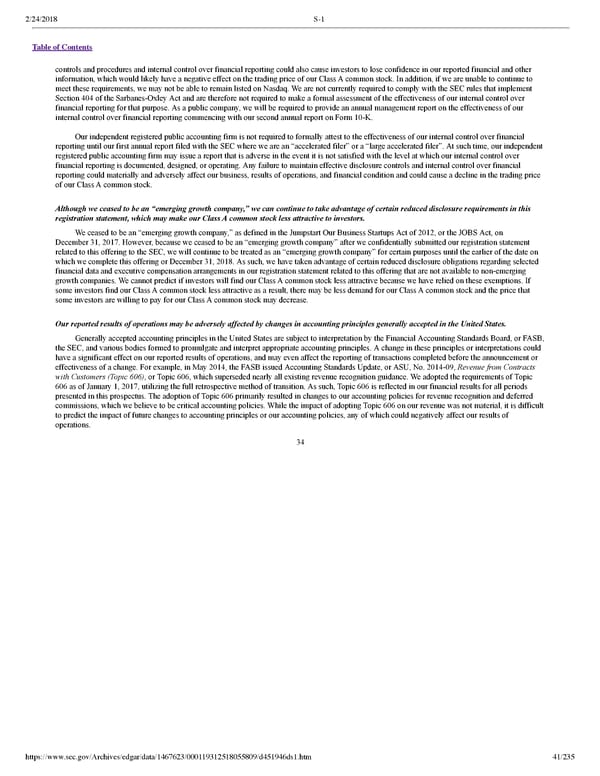2/24/2018 S-1 Table of Contents controls and procedures and internal control over financial reporting could also cause investors to lose confidence in our reported financial and other information, which would likely have a negative effect on the trading price of our Class A common stock. In addition, if we are unable to continue to meet these requirements, we may not be able to remain listed on Nasdaq. We are not currently required to comply with the SEC rules that implement Section 404 of the SarbanesOxley Act and are therefore not required to make a formal assessment of the effectiveness of our internal control over financial reporting for that purpose. As a public company, we will be required to provide an annual management report on the effectiveness of our internal control over financial reporting commencing with our second annual report on Form 10K. Our independent registered public accounting firm is not required to formally attest to the effectiveness of our internal control over financial reporting until our first annual report filed with the SEC where we are an “accelerated filer” or a “large accelerated filer”. At such time, our independent registered public accounting firm may issue a report that is adverse in the event it is not satisfied with the level at which our internal control over financial reporting is documented, designed, or operating. Any failure to maintain effective disclosure controls and internal control over financial reporting could materially and adversely affect our business, results of operations, and financial condition and could cause a decline in the trading price of our Class A common stock. Although we ceased to be an “emerging growth company,” we can continue to take advantage of certain reduced disclosure requirements in this registration statement, which may make our Class A common stock less attractive to investors. We ceased to be an “emerging growth company,” as defined in the Jumpstart Our Business Startups Act of 2012, or the JOBS Act, on December 31, 2017. However, because we ceased to be an “emerging growth company” after we confidentially submitted our registration statement related to this offering to the SEC, we will continue to be treated as an “emerging growth company” for certain purposes until the earlier of the date on which we complete this offering or December 31, 2018. As such, we have taken advantage of certain reduced disclosure obligations regarding selected financial data and executive compensation arrangements in our registration statement related to this offering that are not available to nonemerging growth companies. We cannot predict if investors will find our Class A common stock less attractive because we have relied on these exemptions. If some investors find our Class A common stock less attractive as a result, there may be less demand for our Class A common stock and the price that some investors are willing to pay for our Class A common stock may decrease. Our reported results of operations may be adversely affected by changes in accounting principles generally accepted in the United States. Generally accepted accounting principles in the United States are subject to interpretation by the Financial Accounting Standards Board, or FASB, the SEC, and various bodies formed to promulgate and interpret appropriate accounting principles. A change in these principles or interpretations could have a significant effect on our reported results of operations, and may even affect the reporting of transactions completed before the announcement or effectiveness of a change. For example, in May 2014, the FASB issued Accounting Standards Update, or ASU, No. 201409, Revenue from Contracts with Customers (Topic 606), or Topic 606, which superseded nearly all existing revenue recognition guidance. We adopted the requirements of Topic 606 as of January 1, 2017, utilizing the full retrospective method of transition. As such, Topic 606 is reflected in our financial results for all periods presented in this prospectus. The adoption of Topic 606 primarily resulted in changes to our accounting policies for revenue recognition and deferred commissions, which we believe to be critical accounting policies. While the impact of adopting Topic 606 on our revenue was not material, it is difficult to predict the impact of future changes to accounting principles or our accounting policies, any of which could negatively affect our results of operations. 34 https://www.sec.gov/Archives/edgar/data/1467623/000119312518055809/d451946ds1.htm 41/235
 Dropbox S-1 | Interactive Prospectus Page 40 Page 42
Dropbox S-1 | Interactive Prospectus Page 40 Page 42